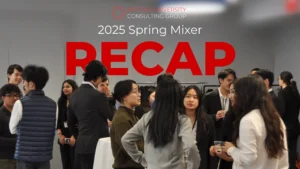The Bold New Path of Business Education
April 11, 2025
Why A New Institute Could Change How Future Leaders Solve Global Problems

By Sarah Lindenfeld Hall
“Business has and will play an important role in society. Younger generations are expressing a lot of skepticism about what that role is.”
Marcel Rindisbacher believes shifting public sentiment and a growing distrust of capitalism means educators have a new mandate: to modernize the way business is taught, researched and debated. The senior associate dean of faculty and research at Boston University’s Questrom School of Business says a new institute will do just that. Launching this fall, the Ravi K. Mehrotra Institute for Business, Markets and Society (IBMS) will pursue an innovative approach to education that’s grounded in actionable research, original data and ongoing dialogue with executives, academics and public officials. B.U. leaders say its groundbreaking model will shape a new understanding about the role of business and how it can be leveraged to create value for the world.
RETHINKING THE OLD APPROACH
As enterprises become more globalized, widened public scrutiny of issues such as greenwashing, tech monopolies, executive compensation and loose regulations has led to rising anti-corporate sentiment. Questrom’s new institute embodies a belief that overcoming those challenges requires evolving the traditional business school rubric from a narrow focus on conventional metrics of enterprise success—into a dynamic platform fostering holistic understanding.
“Within [the academic world], you’re seeing a lot of rethinking of the benefits of capitalism; maybe some of those are appropriate,” says Michael Salinger, Questrom School of Business professor of markets, public policy and law who will lead IBMS’ collaboration with corporate partners. “But, there’s a sense that students aren’t learning why it’s efficient to primarily rely on markets and profit-seeking behavior to organize activity.”
CREATING VALUE ACROSS THREE PILLARS
Rindisbacher, who will be the institute’s director, explains that IBMS students will first explore the role and purpose of enterprise in global economic systems, from which conversations and research will home in on how businesses operate in markets and how markets, in turn, interact with consumers.
To that end, IBMS will integrate teaching, research and engagement across its three foundational pillars: business ideologies and governance, markets and competition, and societal impact. Each pillar tackles a robust portfolio of topics.
“We want to form
business leaders who understand what the role of business in society is, and the way they interact through markets.”
Embracing New
Perspectives
IBMS will influence program development across the Questrom School of Business for undergraduate and graduate students. However, the institute’s founders agree its work must go beyond the B.U. campus and its academic journals to foster deep awareness of market dynamics and economics.
That’s why the institute will take on a multi-dimensional form. One part platform for actionable, cross-discipline research; one part ecosystem of scholars, corporate partners and policymakers; and one part discussion forum, IBMS will offer a number of inventive activities and resources to establish benchmarks, spark conversation and reimagine traditional curricula.
A series of discussions called “Is Business Broken?” to deepen collaboration between academics, business leaders and public officials. These dialogues will produce book chapters for use in business classes.
An index to regularly measure and report public sentiment toward business, relying on large language models to track past and present feelings.
Structured discourse on polarizing business topics to sharpen acumen and enhance the analysis of complex subjects.
An initiative to gain insights into C-suite perceptions of issues such as ESG and regulatory challenges.
A collaboration with scholars from outside organizations and other Questrom institutes, as well as industry leaders serving as executives in residence.
An open-access, multi-channel journal that shares and reacts to actionable research will attract valuable expertise and unique perspectives from around the world.
PAVING THE PATH AHEAD
Rindisbacher says that success for IBMS would reflect an eagerness among global leaders, alumni and academics to return to the school for constructive, relevant and practical discussions and guidance that inspires their work in the world. He believes that will shape a new class of executives whose business education emboldens them to lead for the benefit of all.
“My hope is not that [IBMS] will proclaim business as being the solution to everything,” Rindisbacher says. “The debate that is happening where business is criticized is often not very well-informed, and I think this institute could be a source…where knowledge is deepened, and we have debates—and we understand.”


